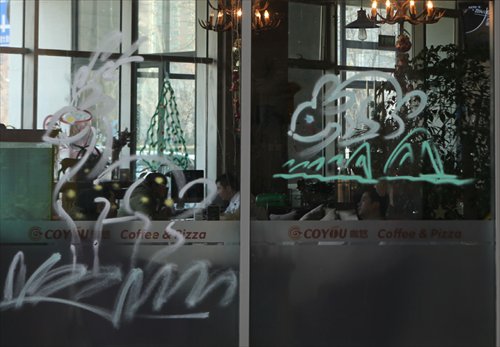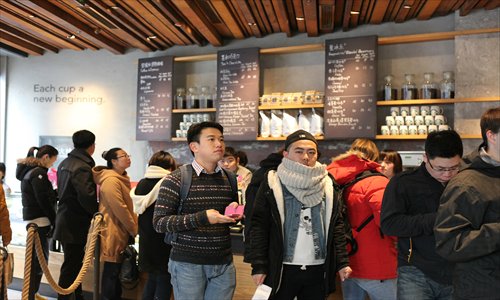Smell the coffee

Customers wait in line to get their drinks at a Starbucks store in Beijing on Saturday. Photo: Park Gayoung/GT
Wangjing, located in the northeast of Beijing, is known as one of the biggest Korean centers in China. The area has long been known for its profusion of Korean restaurants, but coffee shops are now becoming an increasingly visible part of the local landscape as well.
"I stopped counting after seeing around 40 coffee shops in about 400 square meters in the Wangjing area," Kim Sung-jun, a South Korean barista, told the Global Times on January 4. Kim came to Beijing in the summer of 2011 to cater to China's fast-growing taste for coffee.
Battleground
In Wangjing,cafés including small kiosks, South Korean-backed coffee franchises and global firms like Starbucks and Costa Coffee are competing with each other.
"Wangjing is a testing ground for South Korea's coffee businesses," said Kim, who experienced an opening and a closure of a café he worked for before moving on to another one, all in the space of just three years.
In 2012, soon after Kim came to Beijing, the testing ground started to become a battleground, with a sharp rise in openings of new cafés.
A café that Kim worked at was sold not because of lack of profitability but because a South Korean-backed franchise café was about to open up nearby. The management of Kim's café was concerned about increased competition, so they sold the café to the franchise.
Many South Korean cafés have been set up in Wangjing partly to serve the local Korean population. But their bigger goal is to grasp the fast-growing Chinese market. Cafés have long been popular in the South Korean market, which is regarded as having already reached market saturation, Kim said.
The coffee market and café culture in China are growing faster than expected. It used to be believed that China's long history of drinking tea would prove an obstacle, but more and more young people like Gao Qing, a 25-year-old office worker, are embracing the new coffee culture.
Gao, who studied in France for two years, has developed a ritual of sitting in a South Korean café in Wangjing and drinking coffee.
Gao's first café experience was a UBS café five years ago near her college in Wuhan. UBS is a Chinese brand that has a large presence in third- and fourth-tier cities.
Since a branch of Starbucks opened up near her college four years ago, she and her classmates have not been back to the UBS café.
But after she came back from France, she also stopped going to Starbucks, unless she goes with clients that she wants to impress. "I find Starbucks and Costa Coffee stores too loud, and I can't sit there for a long time," Gao said.
Different strategies
South Korean brands, which entered the Chinese market later than their international competitors and have weaker brand power, focus on what they believe local customers are most interested in: varied menus and a cozy environment.
Chinese customers tend to stay longer and order many things, not only drinks but also snacks, partly because they have not fully developed a taste for coffee, Kim and two managers from different South Korean franchises told the Global Times. In order to be successful, you also have to have non-coffee items on the menu, they said.
"We try to serve various kinds of desserts and sandwiches, as the coffee itself doesn't always appeal to Chinese customers," Lee Min-kyung, brand manager for Twosome Coffee, told the Global Times on Wednesday.
Lee said the Chinese market is the most important overseas market for the company, which has opened nine cafés in cities including Beijing, Shanghai, Tianjin and Shenyang since late 2010.
"Outside of South Korea, we have opened Twosome Coffee shops only in China," Lee said. "I think it's the [same] case for many other coffee businesses," she noted.
A consultant from Beijing-based Daxue Consulting told the Global Times Thursday that the coffee market in China has been growing by about 30 percent a year since 2007, and there is still plenty of room for further expansion, which explains the interest of so many international companies in the Chinese market.
Fast expansion
CJ Foodville, which owns Twosome Coffee, is pursuing relatively cautious progress in the Chinese market as numerous South Korean coffee brands have either failed or seen lukewarm results in the market. But one of its competitors, Caffe Bene, is taking more aggressive steps.
Caffe Bene first came to China in April 2012, with the opening of a store in Wangjing and another at the Olympic Forest Park in Beijing. Since then, in partnership with Chinese company Zhongqi Investment Group, it had opened 50 stores by June 2013 and its 100th in December.
Kim Min-ho, one of the company's Shanghai-based managers, told the Global Times on Thursday that by September 2014 the company aims to open 1,000 stores in the Chinese mainland.
This represents rapid progress compared with Starbucks, which entered the country in 1999. It had opened more than 1,000 stores in 60 cities by late 2013 and plans to open 1,500 stores by 2015, according to the company's website.
Instead of controlled market expansion, Caffe Bene is hoping to draw investment from Chinese partners. The manager at Caffe Bene said the company doesn't have preferred locations in China, but that the priority is earning a strong brand image in the Chinese market.
But some analysts believe Caffe Bene's goal is too ambitious, given that so many companies are trying to expand into the market at the same time.
An analyst with Daxue said 10 or 15 percent of the cafés in Qingdao were closed in 2012 due to fierce competition and rising property prices.
Near the café in Wangjing that Gao goes to every Friday, there are at least four other sizable coffee shops. Around 8:30 in the evening, Gao's café is normally the most busy, but it is still far from full.

Customers wait in line to get their drinks at a Starbucks store in Beijing on Saturday. More and more Chinese young people are embracing the coffee culture. Photo: Park Gayoung.GT